Operational Resilience at Alliance Bank: A Strategic Implementation Guide
Chapter 7
Establishing Organisational Goals for Operational Resilience

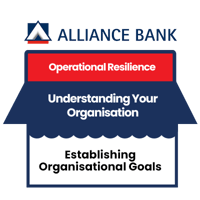 Operational resilience is not merely a compliance checkbox but a strategic imperative.
Operational resilience is not merely a compliance checkbox but a strategic imperative.
At Alliance Bank, aligning organisational goals with resilience principles ensures that our operations can withstand, adapt to, and recover from disruptions without compromising our core business functions.
This chapter outlines the approach to defining and embedding these goals, drawing upon the global standard ISO 22316:2017 on organisational resilience and BNM’s policy documents, including the Operational Risk Integrated Framework (ORIF) and Risk Management in Technology (RMiT).
Understanding the Strategic Importance of Operational Resilience
Operational resilience is the capacity of an organisation to anticipate, prepare for, respond to, and adapt to incremental change and sudden disruptions to survive and prosper.
ISO 22316 emphasises that resilience is not a one-time effort but a continuous journey requiring leadership commitment, strategic alignment, and systemic integration.
BNM reinforces this view by mandating that all financial institutions, including Alliance Bank, develop resilience capabilities as a core part of their risk management and governance frameworks.
The goal is to ensure stability in the financial sector and protect customer interests.
Guiding Principles for Setting Resilience Goals
Drawing from ISO 22316 and BNM guidelines, the following principles guide the development of organisational goals for operational resilience:
- Leadership and Culture: Embed resilience into the bank's culture through tone from the top.
- Stakeholder Needs: Understand and prioritise the needs of key stakeholders, including customers, regulators, and employees.
- Systems Thinking: Consider interdependencies across functions and business units.
- Continuous Improvement: Commit to an adaptive, learning-oriented approach.
Defining Clear and Actionable Goals
Organisational goals for operational resilience should be SMART: Specific, Measurable, Achievable, Relevant, and Time-bound. At Alliance Bank, the following strategic goals form the backbone of our resilience posture:
Maintain Continuity of Critical Business Services
- Identify and prioritise critical operations based on customer impact and regulatory requirements.
- Set recovery time objectives (RTOs) and recovery point objectives (RPOs) for each critical service.
Enhance Incident Response and Recovery Capabilities
- Establish and test response plans for a range of plausible scenarios.
- Ensure coordination between business continuity planning (BCP), crisis management, and IT disaster recovery.
Strengthen Risk Identification and Assessment Mechanisms
- Integrate operational risk assessments with resilience planning.
- Leverage scenario analysis and stress testing to understand vulnerabilities.
Embed Resilience in Technology and Third-Party Arrangements
- Align with BNM’s RMiT requirements by ensuring robust cybersecurity and data protection measures.
- Conduct due diligence and resilience assessments for third-party service providers.
Promote a Resilient Culture and Workforce
- Provide regular training and awareness programs on resilience practices.
- Encourage a proactive mindset towards change and uncertainty.
Governance and Accountability
BNM mandates that the Board of Directors and senior management play a key role in overseeing the implementation of resilience goals.
At Alliance Bank, this translates into:
- Establishing a Resilience Oversight Committee, chaired by the Chief Risk Officer.
- Embedding resilience KPIs into executive performance evaluations.
- Ensuring regular reporting and audits of resilience capabilities and performance.
Integration with Enterprise Strategy and Risk Management
Operational resilience goals must not be pursued in isolation. They should be embedded in the broader enterprise risk management (ERM) framework, strategic planning processes, and corporate performance indicators.
At Alliance Bank:
- Resilience goals are mapped to strategic objectives such as digital transformation, customer trust, and regulatory compliance.
- The ERM team collaborates with business units to ensure alignment across resilience, business continuity, cybersecurity, and operational risk.
Monitoring, Review, and Continuous Improvement
Establishing goals is only the beginning. A robust monitoring and review process is essential to ensure goals remain relevant despite evolving threats and operational changes.
- Conduct annual Resilience Maturity Assessments benchmarked against ISO 22316.
- Perform regular gap analyses to identify and address areas for improvement.
- Use post-incident reviews as learning opportunities to enhance resilience objectives and execution.
Summing Up …
Operational resilience is a strategic enabler for Alliance Bank’s long-term sustainability and customer trust.
By setting well-defined, standard-aligned goals—rooted in ISO 22316 and BNM’s regulatory expectations—we establish a strong foundation for resilient operations.
These goals guide day-to-day risk management and shape our ability to evolve and lead in an increasingly volatile environment.
Operational Resilience at Alliance Bank: A Strategic Implementation Guide |
|||
| Understanding the Organisation: Alliance Bank | |||
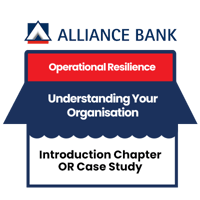 |
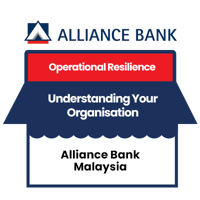 |
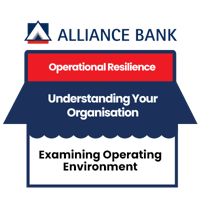 |
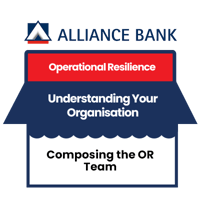 |
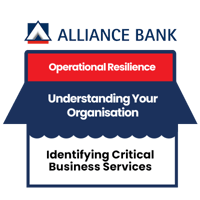 |
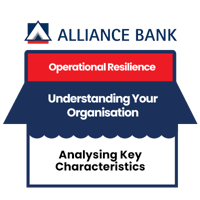 |
 |
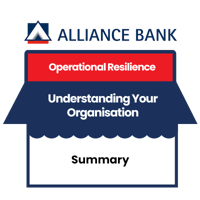 |
More Information About Operational Resilience Courses
To learn more about the course and schedule, click the buttons below for the OR-300 Operational Resilience Implementer and OR-5000 Operational Resilience Expert Implementer courses.
 |
 |
 |
 |
 |
![[BL-OR] [3-4-5] View Schedule](https://no-cache.hubspot.com/cta/default/3893111/d0d733a1-16c0-4b68-a26d-adbfd4fc6069.png) |
![[BL-OR] [3] FAQ OR-300](https://no-cache.hubspot.com/cta/default/3893111/f20c71b4-f5e8-4aa5-8056-c374ca33a091.png) |
 |
|
 |
 |




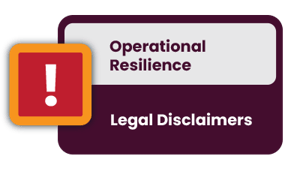





![Email to Sales Team [BCM Institute]](https://no-cache.hubspot.com/cta/default/3893111/3c53daeb-2836-4843-b0e0-645baee2ab9e.png)


